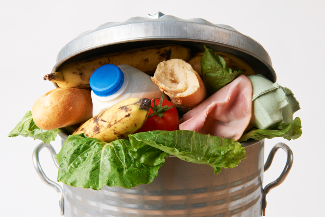Member State Page : France
Last updated on the 01/06/2025

Per capita: 133 kg in 2020
In total: 9 million tonnes in 2020
In total: 8.7 million tonnes in 2021
9.5 tonnes in 2022

Primary production: 1 million tonnes in 2020 Processing and manufacturing: 1.9 million tonnes in 2020
Retail and other distribution of food: 800 000 tonnes in 2020
Restaurants and food services: 1.1 million tonnes in 2020
Households: 4.1 million tonnes in 2020

Retail and collective catering sectors: halve food waste by 2025
Other sectors: halve food waste by 2030
Target
The anti-waste law for a circular economy (AGEC Law) issued in February 2020 enshrined an objective more ambitious than the Sustainable Development Goal Target 12.3. The law sets the objective to halve food waste by 2025 for the retail and collective catering sectors, and by 2030 for the other sectors (compared to 2015).
Measure
France has begun to work on preparing the system for monitoring food waste in order to be able to meet the requirements of the Commission Delegated Decision (EU) 2019/1597 of 3 May 2019. It is mobilising its statistical services in order to be operational (development of certain survey questionnaires, expertise on technical coefficients, ad hoc in-depth analysis in the case of a non-regular statistical survey). The baseline for the level of food waste at national level is defined by the law as the 2015 data. The study (2016) carried out by the Agency for Environment and Energy Management (ADEME) using 2015 data established a detailed reference to evaluate the efforts made in reducing food waste. The baseline at each stage will be available in 2022 based on 2020 data, in line with the European regulation.
Food waste measurement activities also take place at the level of food business operators. Under the national pact against food waste, France has established a working group involving all the stakeholders in order to develop precise indicators to measure food losses and waste in the main professional sectors (collective catering, food and drink industry, retail, production) - a related report and work summary for the 2017-2019 period have been published.
Some studies called ‘pilot operations’ have been carried out for each segment of the food chain, with a small sample of professionals or individuals. Six studies have been carried out since 2016 in the production, food industry, collective catering, retail and household sectors.
As regards primary production, upcoming studies on cultivation practices, carried out every 5 years for each type of production, will include specific questions on indicators related to food losses and waste. Moreover, a pilot operation on fruit and vegetables is being conducted by ADEME to support a sample of producers in the diagnosis and implementation of tools to reduce food losses and waste. The results will be available on 29 September 2021.
Act
National strategy
France has implemented integrated strategies and plans to avoid food waste involving all the stakeholders, such as the national waste prevention program (2014-2020) and the French national pact against food waste (2017-2020). The latter has involved 5 French ministries and 58 stakeholders working together in six working groups.
The national waste prevention program includes several measures to reduce food waste and it ensured continuity of actions foreseen in the first French national pact on food waste, enforced in 2013. Led by the French ministries in charge of agriculture and the environment, as well as ADEME, the national pact was renewed in 2017 until 2020 to respond to a growing concern regarding food waste and a new legislation framework. The pact gathered all the stakeholders involved in the reduction of food loss and waste, through 19 commitments for public authorities and 16 commitments for actors across the food supply chain. The pact included working groups with multi-stakeholder participation, to work collectively on indicators and on measurement of food waste, food donation or gathering and sharing tools to reduce food loss and waste. The pact is being evaluated to assess its effectiveness and to determine the way forward.
The national program on food and nutrition (2019-2023), which contains the national food programme and the national nutrition and health programme, includes major actions related to the reduction of food waste. The French national low-carbon strategy includes actions and indicators related to the reduction of food losses and waste.
Regulatory framework
The food use hierarchy has been enshrined in French law since the adoption of the national law against food waste (Garot Law) in 2016. Moreover, the financial aid provided by the ADEME is in line with this hierarchy: only prevention and donation actions are eligible for financial support.
The Garot Law foresees that action plans against food waste (including diagnosis of the issue) are now mandatory for the collective catering and food and drink industry sectors. Other measures include the prohibition of practices to destroy edible foods in the retail sector (in line with laws adopted later on, these practices have also been prohibited in the collective catering, food and drink industry since 2019, and for wholesalers since 2020).
In order to facilitate food redistribution, retailers over 400m² are obliged to establish partnerships with relevant food aid organisations to donate surplus food since 2016. In accordance with the Egalim Law (2018), this obligation has been extended in 2019 to collective catering operators preparing more than 3000 meals/day and to food and drink industry operators with over 50M€ turnover, as well as to wholesalers with more than 50M€ turnover, in 2020.
Food donation qualifies for a tax reduction of 60% of the value of the food donated, to ensure that food redistribution is more profitable than methanization, for example. A number of sectoral and regional guidelines have also been developed to foster food donation.
The evaluations of the 2016 law have shown positive effects on food donation, such as a diversification of food donation sources and the reinforcement of partnerships. The regulations related to food donation quality have also been reinforced.
The ‘anti-food waste’ label, put forward in the anti-waste law for a circular economy, is intended to reward exemplary practices, undertaken by actors in the public and private sector, to accelerate the achievement of national targets in this area. The terms and conditions for the application of this label were set out in the Decree of 22 December 2020, which calls for the development of a reference framework and a control plan for each sector. Stakeholders are mobilized to co-construct an initial reference framework, together with a control plan.
Territorial approach
Regional networks to avoid food waste (REGAL) have been created in 6 French regions (with new networks under development) to mobilize all the actors of the food supply chain through actions like dissemination of information, creation of collective knowledge, emergence of innovative projects, sharing and capitalization of good professional practices. For example, two of these structures are operating in the regions Nouvelle Aquitaine and Normandie.
Example of actions
The French ministries in charge of agriculture and the environment signed the national pact on date marking initiated by Too Good To Go. The pact includes the development of a national campaign to raise awareness on the difference between ‘best before’ and ‘use by’ dates, as well as the creation of anti-food waste aisles in retail stores.
Several educational activities on food waste have been carried out in schools: a communication campaign with ‘anti-waste tales’; exhibitions; training and educational materials for teachers and pupils etc. The EGalim Law (2018) introduced the education on food waste reduction for consumers in the school curricula and the Ministry of National Education has developed recommendations on this aspect.
With the assistance of ADEME, 1000 primary and secondary schools carried out food waste diagnoses and implemented food waste reduction actions between 2016 and 2018. These establishments have reduced their food waste quantities by an average of 20% across all the stages of their services.
A modification in the initial training of cooks in collective and commercial catering is ongoing, to include information on how to conduct a diagnosis and to implement an action plan to reduce food waste.
National and regional calls for proposals are set up every year in France to support territorial food projects (which have to include actions to reduce food losses and waste), innovative initiatives, as well as other actions related to the national food programme. Through the Future-oriented Investment Program, two projects related to food losses and waste carried out by small and medium-sized firms received funding in 2016: a decision support tool to optimize the second life of products close to their use by date and the development of a cost-effective integrated humidification solution for fresh food departments in order to improve product management and to reduce food waste.
ADEME has been funding several PhD theses on the topic of food losses and waste.
Relevant resources
Links
